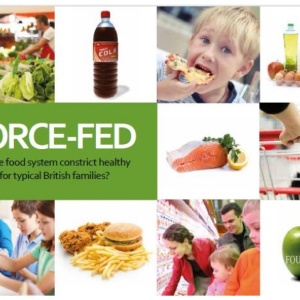
This report by The Food Foundation describes typical British family diets, their healthiness and environmental footprint, and in particular the social and economic drivers that influence typical food choices.
It starts by defining an average family –a family of four, with one primary school-aged child and one secondary school-aged child, and an income between £37,000 and £52,000 (i.e. in the third quintile of UK household incomes). It uses national datasets (mostly for England) to describe the likely composition of their diets, and the health and environmental consequences thereof. The report then considers how and where the family gets their food, before examining the external influences – such as advertising, food pricing and public policy initiatives – that affect the food choices that families make. Finally, the report takes a closer look at a small number of popular food items and investigates the factors that influence their retail pricing.
The key findings of the report are:
- A typical family diet contains excessive amounts of salt, saturated fats, red and processed meat and sugars, and insufficient fibre, fruit and vegetables and fish oils.
- Unhealthy diets are the biggest risk factor for death and disability, contributing to overweight, obesity and Type 2 diabetes; average UK diets contribute to greenhouse gas emissions equivalent to driving a car 5000 miles a year, andaverage European diets are estimated to require as much water per person per day as 53 baths.
- On average, households spend 20% of their household budget on food and drink, 9% of which is subsequently wasted.
- The key reported factors influencing customer food choices are prices, promotions and quality. Health considerations are deemed slightly less important, and considerations of ethical or environmental impacts are deemed important by only a minority of customers.
- Prices of healthy foods are not only higher than prices of less healthy foods, but have also seen steeper price increases in recent years; unhealthy foods also receive more advertising and are subject to more offers than healthy foods.
- Health labelling is deemed confusing, and the voluntary nature of much food labelling only adds to this.
- Food supply chains and the changing nature of the food market in the UK mean that highly processed and other unhealthy foods are often cheaper to produce, while production and consumption of vegetables in the UK is declining, with more vegetables being imported.
The report concludes by making a number of policy recommendations for governments focussing on managing the food environment – that is, advertising, pricing, etc. – to shift the balance of diets in more healthy and sustainable directions.
Extracts from executive summary:
This report looks at what typical British families eat, and what is influencing their choice of food and drink. We examine how easy it is for them to choose a healthy diet and review whether government policy could do more to make healthy choices easier.
There are three main findings:
- The diets of typical British families now pose the greatest threat to their health and survival.
- A multitude of factors in their food environment get in the way of our family eating healthily.
- The balance of prices of their food is wrong, tipping them even further towards unhealthy diets. Educating individuals on how to make healthy choices can’t work when there are so many factors pushing behaviour in the opposite direction. The onus is on government to take concerted action (from local to European level) to make it easier for people to eat healthily. We recommend four actions for government:
- Set out a clear vision for achieving healthy and sustainable diets for all, with targets that can be monitored.
- Use policy measures to achieve a healthy balance in food costs.
- Manage the food environment so it enables healthy choices, particularly for children.
- Make it easier for consumers to know what they are eating so they are empowered to demand a healthy and sustainable food system
This report offers a system-based analysis of some of the policy levers that can be used to make it easier for typical British families to make healthy choices and avoid the life-threatening and costly consequences of diet-related disease, while at the same time going further to protect us all from the disastrous effects of climate change.
Citation:
The Food Foundation (2016) Force-fed: Does the food system constrict healthy choices for typical British families? The Food Foundation, London
Read the full report and view related material (including a useful infographic) here.
You can find related resources in the research Library categories on health issues, governance and policy, economy, retailing, and the consumer stage. See also keyword categories behaviour and practice, public attitudes, food labelling, diabetes, overweight/obese, nutrition policy.







Post a new comment »